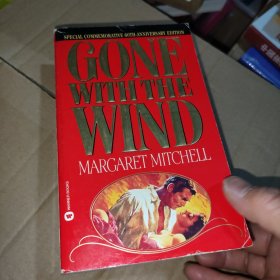
Gone with the Wind飘/乱世佳人 英文原版
¥ 15 1.8折 ¥ 81.8 八五品
仅1件
作者Margaret Mitchell(玛格丽特·米切尔) 著
出版社Oversea Publishing House
出版时间2008-05
版次1
装帧平装
货号凯旋AA31
上书时间2024-11-23
- 在售商品 暂无
- 平均发货时间 14小时
- 好评率 暂无
- 最新上架
商品详情
- 品相描述:八五品
图书标准信息
- 作者 Margaret Mitchell(玛格丽特·米切尔) 著
- 出版社 Oversea Publishing House
- 出版时间 2008-05
- 版次 1
- ISBN 9781416548942
- 定价 81.80元
- 装帧 平装
- 开本 48开
- 纸张 胶版纸
- 页数 1472页
- 正文语种 英语
- 【内容简介】
-
Margaret Mitchell's epic novel of love and war won the Pulitzer Prize and went on to give rise to two authorized sequels and one of the most popular and celebrated movies of all time.
Many novels have been written about the Civil War and its aftermath. None take us into the burning fields and cities of the American South as Gone With the Wind does, creating haunting scenes and thrilling portraits of characters so vivid that we remember their words and feel their fear and hunger for the rest of our lives.
In the two main characters, the white-shouldered, irresistible Scarlett and the flashy, contemptuous Rhett, Margaret Mitchell not only conveyed a timeless story of survival under the harshest of circumstances, she also created two of the most famous lovers in the English-speaking world since Romeo and Juliet.
玛格丽特·米切尔短暂的一生并未留下太多的作品,但只一部《飘》足以奠定她在世界文学史中不可动摇的地位。《飘》以南北战争时期南方动乱的社会现实为背景,以“乱世佳人”斯佳丽为主线,描写了几对青年的爱情纠葛,具有浓厚的浪漫主义色彩。自问世以来,这部作品已成为享誉世界的爱情小说,并被拍成电影。 - 【作者简介】
-
Margaret Mitchell(1900 - 1949), born in Atlanta in 1900, Margaret Mitchell grew up surrounded by relatives who told endless tales of the Civil War and Reconstruction. She knew those who were relics of a de-stroyed culture, and those who had put aside gentility for survival. Her mother instilled in her that education was her only security. She attended Smith College but had to come home when her mother fell ill. After her mother's death, Margaret resolved that she had to make a home for her father and brother, so she left college and returned to Atlanta.
In 1923, she became a feature writer for the Atlanta Journal, and in 1925, she married John Marsh, a public relations officer for Georgia Power. She found most of her assignments unfulfilling, and she soon left to try writing fiction more to her own taste. Her own harshest critic, she would not try to get her work published. She began to write Gone with the Wind in 1926, while recovering from an automobile accident. Over the next eight years she painstakingly researched for historical accuracy.
She accumulated thousands of pages of manuscript. Here is how she later described her life's labor: "When I look back on these last years of struggling to find time to write between deaths in the family, illness in the family and among friends which lasted months and even years, childbirths (not my own), divorces and neuroses among friends, my own ill health and four fine auto accidents ... it all seems like a nightmare. I wouldn't tackle it again for anything. Just as soon as I sat down to write, somebody I loved would decide to have their gall-bladder removed. ... "
In 1934, an editor from Macmillan's Publishers came to Atlanta seeking new authors. He was referred to John and Margaret Marsh as people who knew Atlanta's literary scene. She steered him to several prospects, but didn't mention her own work. A friend told him that she was writing a novel, but she denied it. On the night before he was to leave Atlanta, she appeared at his hotel-room door with her still imperfect, mountainous manuscript and left it with him for better or for worse.
玛格丽特·米切尔(1900-1949),出生在美国佐治亚州亚特兰大市的一个律师家庭。她的父亲曾经是亚特兰大市的历史学会主席。在南北战争期间,亚特兰大曾于1864年落入北方军将领舒尔曼之手。小时候,玛格丽特经常听到周围的人谈论南北战争,这对她以后的写作产生了重要影响。
1922年,玛格丽特开始用昵称“佩吉”为《亚特兰大日报》撰稿,大量报道见诸报端,其中有一组便是玛格丽特为过去南方邦联将领写的专题报道。1926年,腿部负伤的玛格丽特不得不辞去报社的工作,在丈夫的鼓励下开始致力于创作。当26岁的玛格丽特决定创作一部关于南北战争的小说时,亚特兰大自然就成了小说的背景。
相关推荐
-

Gone with the Wind
九品成都
¥ 6.00
-

Gone with the Wind
九品北京
¥ 23.00
-

Gone with the Wind
八品周口
¥ 22.00
-

Gone with the Wind
八五品北京
¥ 6.00
-

Gone with the wind
八五品衡水
¥ 70.00
-

Gone with the Wind
九品北京
¥ 40.00
-

Gone with the Wind
八五品上海
¥ 15.00
-

Gone with the Wind
八五品北京
¥ 10.00
-

Gone with the Wind
八五品长沙
¥ 25.00
-

GONE WITH THE WIND
八品嘉兴
¥ 10.00
— 没有更多了 —












以下为对购买帮助不大的评价